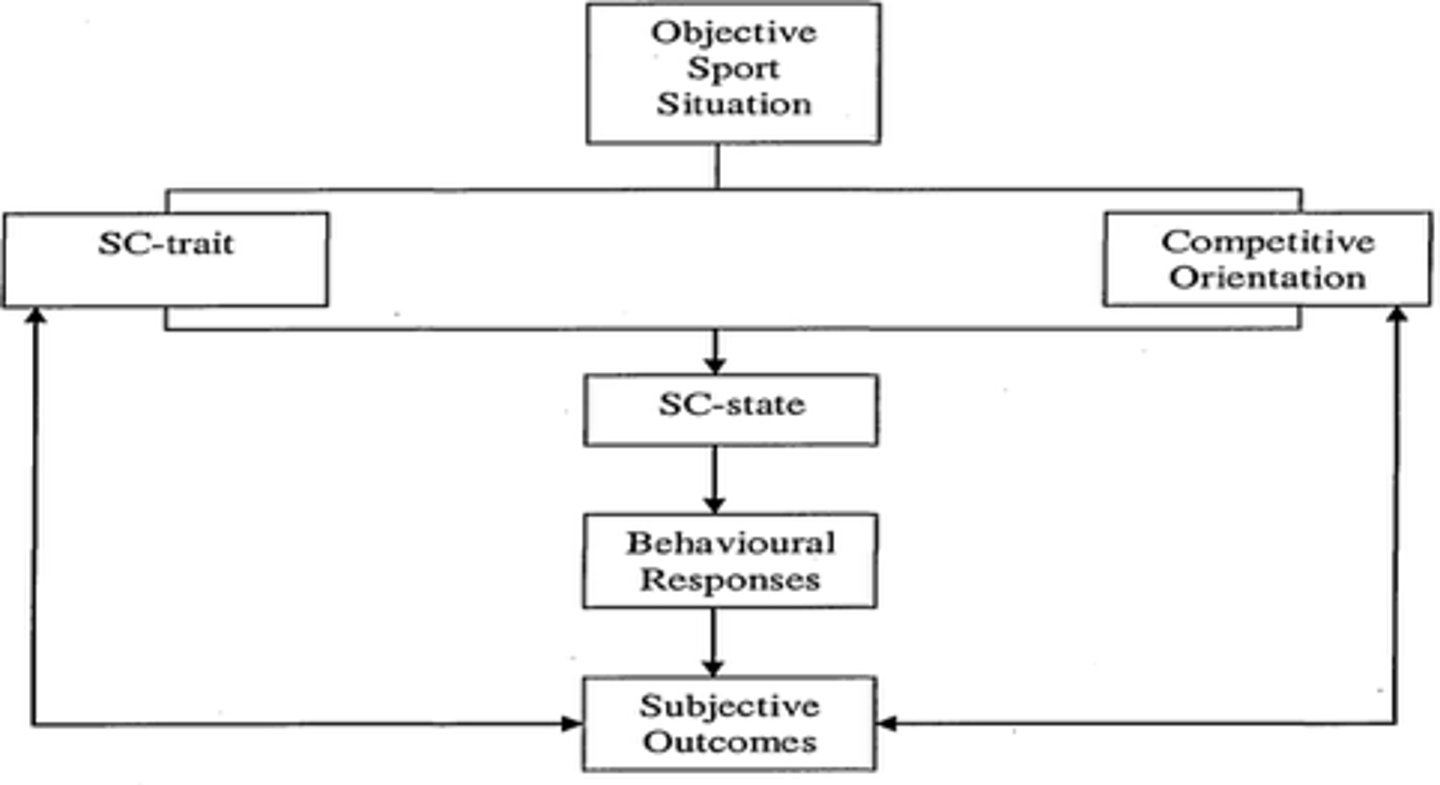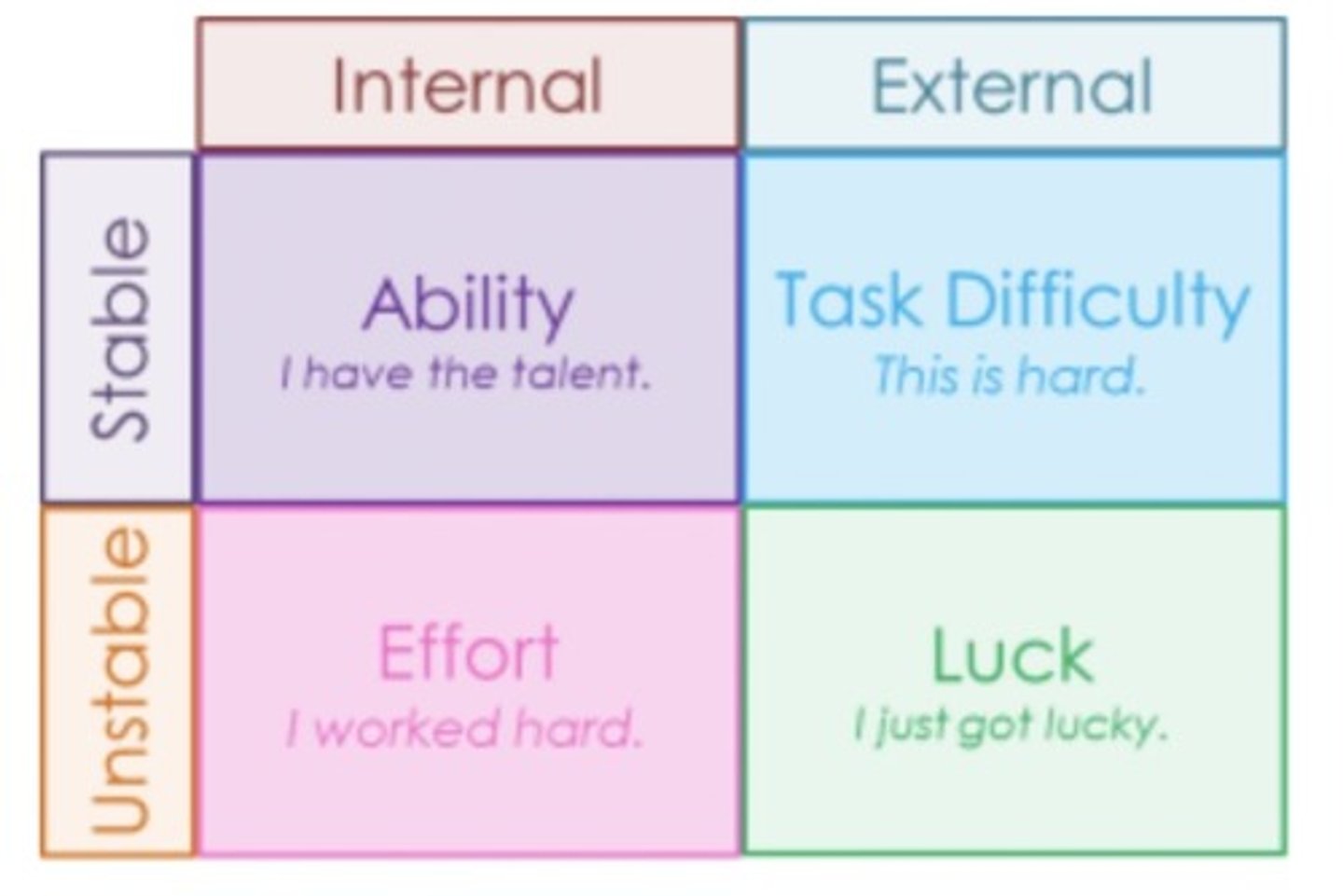PE: Psychology Attribution in Sport / Confidence and self-efficacy in sports performance
1/30
There's no tags or description
Looks like no tags are added yet.
Name | Mastery | Learn | Test | Matching | Spaced |
|---|
No study sessions yet.
31 Terms
Sports confidence
The belief or degree of certainty individuals possess about their ability to be successful in sport. It is a global term. When you have high levels of sports confidence, you have a firm belief in your own judgements and ability in sport.
Self-efficacy
the self-confidence we have in specific situations. A person who has belief in their ability to achieve success will have high efficacy - e.g a tennis player's belief in how many first serves will be successful.
Self-esteem
the feeling of self-worth that determines how valuable and competent we feel.
Sports confidence can affect levels of self-esteem. Those with high levels of sports confidence will often have high self-esteem, which will help performance because sport often demands high levels of arousal or drive to achieve. Those with low levels of sports confidence may experience low self-esteem and feel that they are not good enough or valuable enough to contribute to team or individual sports performance.
Impacts of sports confidence
-impact on sports performance as you may be more motivated to achieve and will take firm decisions that are more likely to have positive outcomes in sport if you have high levels of self-confidence. For example, an athlete with high levels of sports confidence in the 100m sprint is more likely to achieve a better time than someone with low sports confidence.
-Impact on participation. Those who have low sports confidence may shy away from activities and avoid situations that may be related to competition. High sports confidence would enable them to participate with other people and not feel inhibited, and feel more able to engage in team activities.
Positive self-esteem = good psychological wellbeing =
-reduced anxiety
-better body image
-less chance of conforming to social pressure
-optimistic outlook on life
-fewer interpersonal problems
-less likely to engage in risky behaviours, e.g drugs
Vealey's sports confidence model
investigates the relationship between achievement motivation or competitiveness and self-confidence in sport.

Children with negative self-esteem are more likely to:
-be depressed
-have eating disorders
-engage in risky behaviours
-not participate in sport
-get bullied or become bullies
Vealey's Sport Confidence Model
SC-trait
innate level of sports confidence
Vealey's Sport Confidence Model
Competitive orientation
existing level of competitiveness
Vealey's Sport Confidence Model
SC-state
amount of SC-trait and competitive orientation - level of self-efficacy during competition. The level of SC-state dictates the behaviour that is shown and the skill level of the performance.
If the athlete has a high level of SC-state, their behaviour is more likely to be confident and well motivated, and performance is likely to improve and vice versa.
Vealey's Sport Confidence Model
Subjective perceptions of outcome
After performance - how someone interprets their performance in sport.
These emotions will affect the athletes confidence and competitiveness in the future. The more confident you are, the more successful you will be, and the more successful you are, the more confident you will be.
Bandura (1977)
self-confidence can often be specific to a particular situation - self-efficacy. This specific confidence can vary from situation to situation and can affect performance if the individual is skilful enough. People who expect to be confident in a particular situation are more likely to choose that activity.
Self-Efficacy depends on 4 types of information according to Bandura's theory of self-efficacy (1977)
1. Performance accomplishments (i.e past experiences)
2. Vicarious experiences (i.e modelling by others)
3. Social persuasion (i.e coaching and feedback)
4. Physiological and emotional states (i.e arousal)
Attribution in sport
-attribution theory is linked to sport
-reasons, excuses for winning/losing affect motivation e.g if a coach says you are hopeless, it might lower your motivation or it might fire you up.
-attributions are the perceived causes of a particular outcome e.g a football team may blame the weather for losing.
-attributions are important because of the way they affect motivation, which affect future performances, future effort and participation
-attributional retraining is when you change inappropriate attributions to more helpful and motivating ones for the sake of future successes.
Weiner's model of attribution
-four main reasons for results (ability, effort, task difficulty and luck).
-constructed a two-dimensional model (locus of causality and stability)

The locus of causality
-refers to whether the attributions come from within the person (internal) or from the environment (external) and affects a person's feelings or pride, confidence and shame.
Stability
-refers to whether the attribution is changeable or unchangeable and affects a person's expectations of future outcomes.
-If the reasons given for winning are stable, the individual is motivated to achieve again. If failure is attributed to an unstable factor, the individual is more likely to try again because there is a good chance that the outcome will change.
Negatives of Weiner's model
-it is not sports specific, which causes problems when trying to apply it to sports situations. For instance, task difficulty changes frequently in sport, especially in team games, because the opposition changes.
-this model can be applied to sport in general and can be used to promote reasons for sports outcomes that can be motivating rather than demotivating.
Self-serving bias
sports performers who tend to attribute their failure to external causes causes, while those who succeed usually attribute their success to internal causes.
Weiner's third dimension to attribution model
-controllability, the greater or lesser personal control over event outcomes
-whether a cause for a sports outcome is controllable or uncontrollable
-coaches praise effort and controllable success, and criticise lack of effort and controllable failures. Concentrating on uncontrollable external and stable factors is not of much use if you want to turn failure into success.
Attributed causes according to locus of causality, stability and controllability continuums.
-ability: internal, stable, uncontrollable
-effort: internal, unstable, controllable
-difficulty: external, stable, controllable/uncontrollable
-luck: external, unstable, uncontrollable
Learned helplessness
-refers to the belief that failure is inevitable and a feeling of hopelessness when faced with a particular situation (specific learned helplessness) or groups of situations (global learned helplessness)
-specific learned helplessness: 'I am a hopeless football player'
-global learned helplessness: 'I am hopeless at all sport'
Low achievers
-NAF (need to avoid failure)
-often attribute their failure to uncontrollable factors, which can lead to learned helplessness.
High achievers
-athletes who have mastery orientation see failure as a learning experience, and who will attribute failure to controllable unstable factors.
-Nach performers who are not afraid of failing and will persist with a task until they succeed.
Mastery orientation
-the view that an individual will be motivated by becoming an expert in skill development or sports performance.
-an athlete who has mastery orientated will often attribute failure to internal, controllable and unstable factors, such as effort, and will continue to strive to get better. Seek to develop their competence by acquiring new skills and mastering new situations. They are not concerned about their performance relative to others, but rather with improving their understanding of the sport, fitness and skill.
Attributional retraining
-often seeks to change learned helplessness into mastery orientation
-many attributions that are given are subjective and are therefore not desirable for future progression, e.g a hockey player used to play for a team that constantly blamed officials for losing. The team had a bad reputation and were not attributing their poor results to changeable or realistic factors.
-attributions often need to be reassessed in order to succeed in the future. A person who fails a task should be encouraged to attribute to controllable, unstable factors. For example, a team of 17 year old girls who have just narrowly lost a football match should give attributions such as 'must try harder next week' (internal, unstable, controllable). Using attribution this way is more likely to result in mastery orientation.
Vealey identified strategies to improve state sports confidence:
1. Mastery of skill (practice)
2. Styling
3. Physical and mental preparation
4. Social reinforcement (praise by others)
5. Effective leadership
6. Environmental comfort.
3 things that Vealey says confidence is based on:
1. Personality - level of competitiveness and achievement motivation.
2. Experience - amount of past success on the task and your belief in your ability to succeed in future.
3. Situation - e.g playing home or away
Trait confidence
innate confidence shown in most situations.
State confidence
situation specific e.g taking a penalty
How a coach can promote confidence:
-positive feedback/reinforcement/encouragement
-demonstrations
-empathy
-provide role models
-control arousal with relaxation techniques
-set attainable yet challenging goals
-allow early success